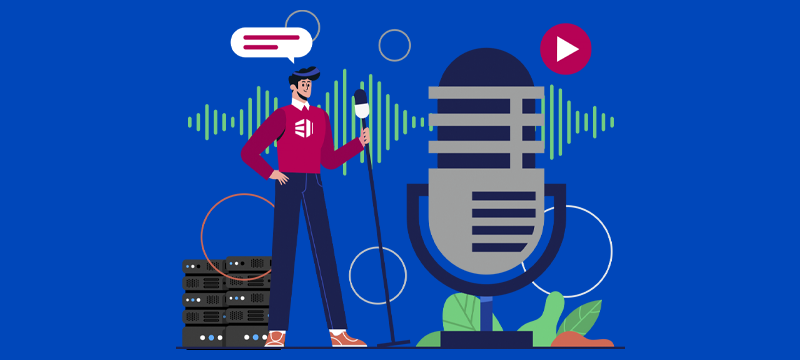Entertaining, informative and highly convenient to listen to, podcasts have become extremely popular over the last decade or so. What’s more, given a decent PC, mic and the right ideas, anyone can make them. Indeed, lots of people do. However, if you want to make your podcasts available for 24-hour streaming so anyone can listen at any time, you are also going to need somewhere to host them online. In this post, We’ll discuss how to find the right hosting solution for your podcast’s needs.
Bandwidth
As a podcaster, you’ll want your listeners to be able to stream or download your shows without encountering problems like buffering or crashing. Unfortunately, these can happen if the number of people tuning in to your podcast is too big for your server’s bandwidth. Bandwidth is the amount of data that can be transmitted over your internet connection at any one time. If you imagine your podcasts to be water, bandwidth is the width of the pipe they travel through. If you want to prevent connection problems, you’ll need wide enough bandwidth to cope with all your listeners.
In practical terms, this means when choosing a hosting solution, you’ll need a server that is powerful enough to process and transfer all the data your listeners are requesting. A good starting point is VPS hosting, however, as your podcast grows, you may need to upgrade to a dedicated server or cloud hosting.
Storage space
High-quality recordings of podcasts can be large files to store. What’s more, most podcasters make regular shows and keep older episodes available for new listeners to catch up on. This means that over time, your storage needs are going to grow. If you look at the file size of just one of your shows and then multiply this by the number you will have produced over the next five years, you’ll have a good idea of how big your storage will need to be if you wish to keep them all accessible. Remember that the bit rate of your recordings affects the file size, so by using a smaller bit rate, you can reduce storage capacity and have less of an impact on your listeners’ data usage.
When looking for a hosting solution for your podcast, storage capacity is, therefore, an essential consideration. That said, VPS hosting solutions offer between 50GB and 500GB, enough to store years of podcasts.
Easy to use
While podcasters are likely to be familiar with technology, given how podcasts are recorded and edited, this doesn’t mean they want the technical side of running their hosting to be difficult or overly time-consuming. Making it easy is down to the quality of the control panel that you use. Good control panels, like cPanel or Plesk, come with user-friendly, intuitive dashboards on which you’ll find all the tools you need, neatly organised. They also come with helpful wizards to guide you through the technical processes. As a result, uploading, organising and managing your episodes will be so much easier.
Keeping your podcasts secure
Cybercriminals will target any server they think they can exploit, and podcasting servers are no exception. While having episodes ransomed is one fear most podcasters have, hackers are just as likely to want to infect your episodes with malware so that they can then go on to infect your listeners’ devices too. There are a multitude of other malicious things they can use your server for as well, once they have control.
Given the rise and sophistication of modern cybercrime, choosing a host that is serious about security is a no-brainer. Check that your host defends your server with firewalls, intrusion and malware prevention systems, DDoS protection, secure file transfers and other security features.
Backing up your podcast
If your podcasts are your life’s work, the last thing you want is for them to permanently disappear. Unfortunately, this can happen for various reasons, like accidental deletion, hardware failure, software corruption and cybercrime.
The only way to ensure you never lose them is to keep backup copies of your episodes. A reliable host will offer a backup solution that not only provides enough storage for all your episodes but will back them up at the frequency you need, encrypt them to prevent them from being accessed and check them for integrity so that, if you ever need to restore them to your server, you will have a viable copy to use.
Help whenever you need it
No matter how great the technology or how good we are at using it, we all come across issues that we need help with from time to time. If you encounter a technical hitch, you’ll need expert help quickly to stop it from impacting your podcast. When looking for a host, it is crucial that you find one which offers 24/7 technical support, every day of the year. Technical support, which differs from customer service, means you’ll have a hosting specialist on hand to help you fix issues as swiftly as possible.
Conclusion
If you intend on making your episodes available to stream from your own website instead of from a third party, then your hosting solution is the engine room of your podcast. You’ll need to choose a solution that can cope with your audience size and your storage needs while finding a provider that offers easy-to-use control panels, robust security, effective backup solutions and 24/7 technical support.
For more information about our managed VPS Hosting plans visit our Linux VPS or Windows VPS pages.



